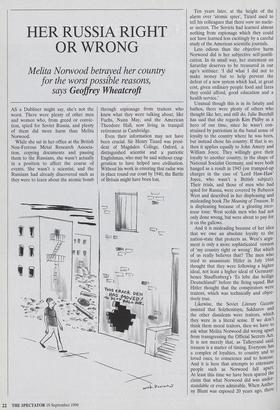HER RUSSIA RIGHT OR WRONG
Melita Norwood betrayed her country
AS a Dubliner might say, she's not the worst. There were plenty of other men and women who, from greed or convic- tion, spied for Soviet Russia, and plenty of them did more harm than Melita Norwood.
While she sat in her office at the British Non-Ferrous Metal Research Associa- tion, copying documents and passing them to the Russians, she wasn't actually in a position to affect the course of events. She wasn't a scientist, and the Russians had already discovered such as they were to learn about the atomic bomb through espionage from traitors who knew what they were talking about, like Fuchs, Nunn May, and the American Theodore Hall, now living in tranquil retirement in Cambridge.
Even their information may not have been crucial. Sir Henry Tizard was presi- dent of Magdalen College, Oxford, a distinguished scientist and a patriotic Englishman, who may be said without exag- geration to have helped save civilisation. Without his work in ensuring that radar was in place round our coast by 1940, the Battle of Britain might have been lost. Ten years later, at the height of the alarm over 'atomic spies', Tizard used to tell his colleagues that there were no nucle- ar secrets. The Soviets had learned almost nothing from espionage which they could not have learned less excitingly by a careful study of the American scientific journals.
Less odious than the objective harm Norwood did is her subjective self-justifi- cation. In its small way, her statement on Saturday deserves to be treasured in our age's sottisier: 'I did what I did not to make money but to help prevent the defeat of a new system which had, at great cost, given ordinary people food and fares they could afford, good education and a health service.'
Unusual though this is in its fatuity and bathos, there were plenty of others who thought like her, and still do. Julie Burchill has said that she regards Kim Philby as a hero of our time, since he wasn't con- strained by patriotism in the banal sense of loyalty to the country where he was born, but instead chose his country. If that is so, then it applies equally to John Amery and William Joyce. They willingly gave their loyalty to another country, in the shape of National Socialist Germany, and were both hanged as a result in 1945 (on trumped-up charges in the case of 'Lord Haw-Haw' Joyce, who wasn't a British subject). Their trials, and those of men who had spied for Russia, were covered by Rebecca West and described in her displeasing and misleading book The Meaning of Treason. It is displeasing because of a gloating trico- teuse tone: West scolds men who had not only done wrong, but were about to pay for it on the gallows.
And it is misleading because of her idea that we owe an absolute loyalty to the nation-state that protects us. West's argu- ment is only a more sophisticated version of 'my country right or wrong'. But which of us really believes that? The men who tried to assassinate Hitler in July 1944 thought that they were following a higher ideal, not least a higher ideal of Germany: hence Stauffenberg's 'Es lebe das heilige Deutschland!' before the firing squad. But Hitler thought that the conspirators were traitors, which was technically and objec- tively true. Likewise, the Soviet Literary Gazette insisted that Solzhenitsyn, Sakharov and the other dissidents were traitors, which they were in a literal sense. If we don't think them moral traitors, then we have to ask what Melita Norwood did wrong apart from transgressing the Official Secrets Act. It is not merely that, as Talleyrand said, treason is a matter of timing. Everyone has a complex of loyalties, to country and to loved ones, to conscience and to honour. And it is here that attempts to extenuate people such as Norwood fall apart. At least this time we have been spared the claim that what Norwood did was under- standable or even admirable. When Antho- ny Blunt was exposed 20 years ago, there were some who tried to gloze his conduct by saying that he had been driven by a hatred of fascism and the Nazi threat, and that the British and Russians had been wartime allies.
This was a remarkably poor argument even on its own terms. Russia and the Comintern were far from consistent oppo- nents of Nazism (the German communists and Nazis actively colluded to destroy the Weimar Republic). And Blunt, with the rest of the Cambridge Gang, continued to serve Russia in the period from August 1939 to June 1941 when Stalin and Hitler were practical as well as spiritual allies. It was also argued that there had been an absolute difference between those who at one time merely joined or supported the Communist party, like so many honoured ancients of today, and those such as Blunt who actively betrayed their country. But this wasn't so true — or at least so simple — either.
That defence was demolished by the late Philip Toynbee. He once said with charac- teristic honesty that, when he was running the Oxford CP in 1938, there was absolute- ly nothing he would have not been pre- pared to do for the party, and he would have been honoured to be asked. What's so easily misunderstood is that communism was not just another political Movement or tendency. It was a creed and a cause, a faith that could move mountains and which inspired great heroism and self- sacrifice. Some of those who succumbed to its thrall were stupid as well as nasty, like Melita Norwood; some were highly intelli- gent and even likeable, as one is aware from having known them.
And there was above all one crucial way in which it was not just another party. What we call communism was not in the end char- acterised by being progressive, or Marxist, or socialist, or revolutionary, or on the Left (the anarchists and Trotskysists didn't think the Comms left-wing at all!). It was distin- guished in the end by unconditional loyalty to one country, as it happened a remote and barbarous tyranny. In Raymond Aron's words, the communist was he who made no distinction between the Revolution and the interests of Soviet Russia. And another great Frenchman had an even more lethally accurate phrase. As the socialist leader Leon Blum said, the Parti Communiste Francais — and this went for every other Western Communist party, including Melita Norwood's CPGB — was 'a foreign nation- alist party'. What makes the position of the ideological traitors such as Burgess and Norwood, or Amery and Joyce, so absurd as well as so contemptible is that they did not betray their native country for love or con- science or moral honour. As Miss Burchill so truly says, they exchanged the patriotism of birth for another patriotism, not to say a fanatical jingoist nationalism. Communists sneered at the Englishman who said, 'my country right or wrong'. But that was exactly what the spies themselves acted upon: Sovi- et Russia right or wrong, which in practice meant Russia wrong, wrong and wrong again.
There may have been good security rea- sons why Norwood wasn't prosecuted. And, whatever a Fleet Street lynch mob may say, there is no purpose in imprison- ing her as she approaches the age of 90, though it's quite tempting to send her to North Korea.
The best thing is to keep her here as a sad specimen, an object lesson in trans- ferred nationalism, and the folly of a whole age which believed that you can't make an omelette without breaking eggs. Or perhaps Melita Norwood might say, what are 25 million innocent corpses besides cheaper tram fares in Omsk?



























































































 Previous page
Previous page